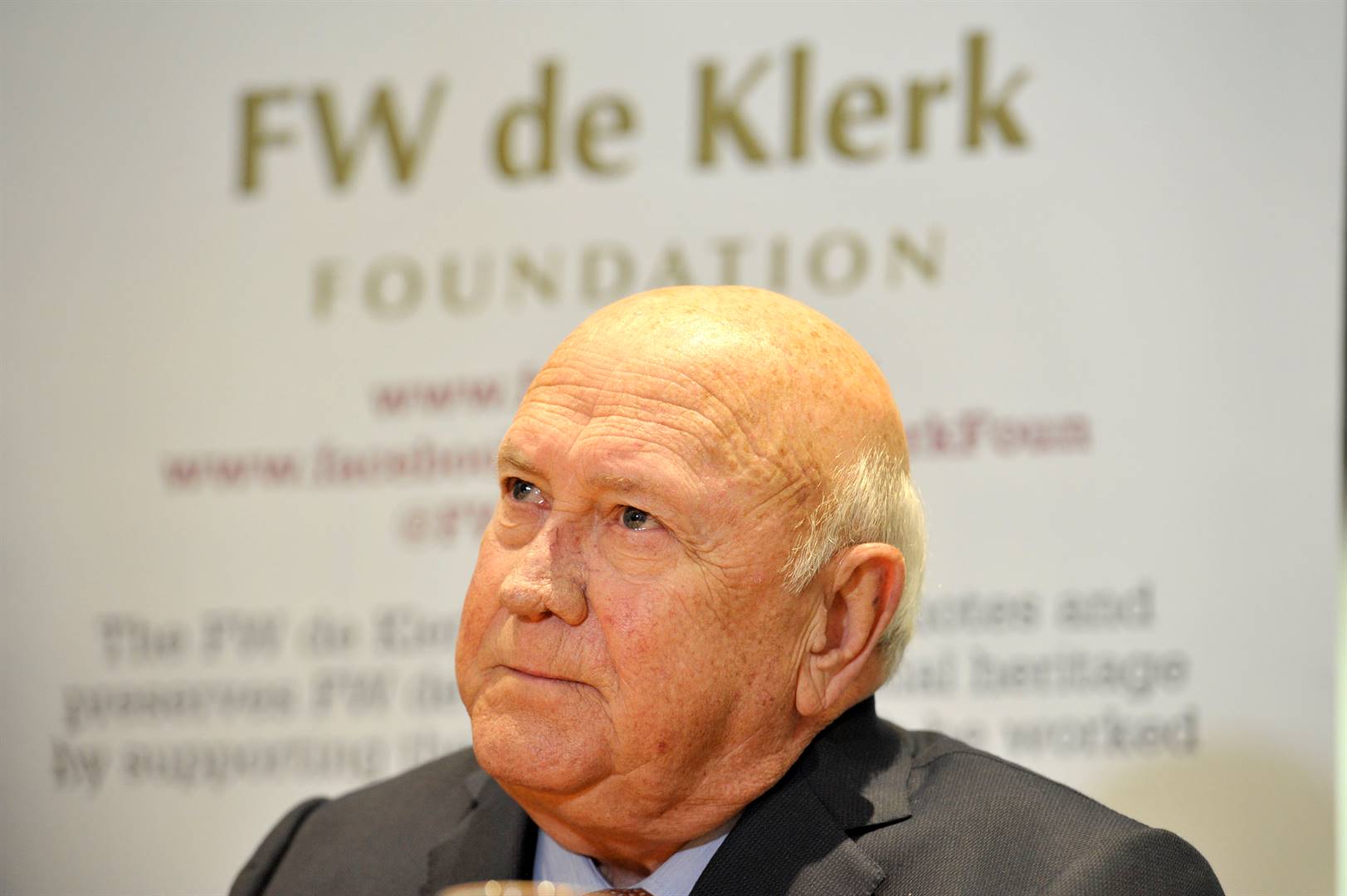


Former president FW de Klerk. Picture: Archive
- The American Bar Association had invited FW de Klerk to speak at its upcoming 2020 Virtual Annual Meeting.
- The association received a number of letters from activists and others, urging it to reconsider De Klerk’s participation.
- De Klerk has defended himself, saying his “contribution was to abolish apartheid”.
Former President FW de Klerk’s spokesperson says he “withdrew his acceptance” of an American Bar Association (ABA) invitation to speak on, among other things, rule of law, racism and “minority rights” because he did not want to cause embarrassment to event organisers – who stated on Saturday that they had cancelled the event.
But Dave Steward, on behalf of De Klerk, says the allegation that he was involved in gross violations of human rights is “baseless”.
“Despite its diligent investigation of all of the evidence before it, the Truth and Reconciliation Commission failed in its efforts to link him with any such action. However, it appears unacceptable in the current super-heated racial climate that any leader from South Africa’s troubled past should be permitted to retain the slightest vestige of honour.”
READ | American Bar Association cancels FW de Klerk talk on rule of law, racism after wave of objections
De Klerk was scheduled to speak to Jonathan Granoff, the President of the Global Security Institute, in a virtual discussion on “Lessons Learned in the Crucible of Courage and Conscience” hosted by the ABA on 1 July.
“We understand that Mr Granoff issued the invitation because of the role that FW De Klerk played in initiating and co-directing South Africa’s historic transition from white minority rule to non-racial constitutional democracy; because he is the only national leader who has ever dismantled an existing nuclear arsenal; and for his continuing defence of South Africa’s embattled constitution,” Steward says.
“All these roles should be of considerable interest to any audience that is concerned about the peaceful resolution of long-standing racial conflicts; the promotion of a nuclear weapon-free world; and the evolution of non-racial constitutional democracy.”
But, following a deluge of objections from, among other people, former Truth and Reconciliation commissioners, global and local human rights lawyers, activists and legal bodies and the son of murdered anti-apartheid activist Fort Calata, the ABA International Law Section confirmed to News24 that De Klerk’s conversation had been cancelled.
“Presenting the programme would not help the association advance our Goal III priority,” it stated, in reference to its aim to “eliminate bias and enhance diversity” by promoting “full and equal participation in the association, our profession, and the justice system by all persons” and eliminating “bias in the legal profession and the justice system”.
According to Steward, it was De Klerk who effectively cancelled the event.
“Mr De Klerk does not have the slightest interest in participating in any event that will cause him or his hosts embarrassment and had no hesitation in withdrawing his acceptance of the ABA’s invitation as soon as he heard of the controversy.”
Steward has dismissed the allegations made against De Klerk by lawyers, activists and Lukhanyo Calata – which detailed his alleged complicity in state-sanctioned apartheid murders – as “outrageous and unfounded”.
He further suggested that the “vitriolic reaction” to news of De Klerk’s address by activists in South Africa and the US was driven by “the current super-heated climate relating to issues of race”.
“This matter is of passing significance for Mr De Klerk,” Steward says.
“However, it is symptomatic of a growing threat to liberal values everywhere that should be of the deepest concern to all those who still value freedom of speech, toleration of diverse views and the open exchange of ideas on important topics.”
According to Steward, the role that De Klerk “played in initiating and co-directing South Africa’s transition to non-racial democracy is a matter of historic fact” and had been “confirmed” by former president Nelson Mandela during a speech he gave at De Klerk’s 70th birthday.
While a number of human rights activists and lawyers had taken specific issue with De Klerk’s comments to the SABC in February this year that he did not agree that apartheid constituted a “crime against humanity”, Steward on Sunday said De Klerk “has acknowledged that the apartheid system that he inherited from history was ‘a crime against humanity’ as defined in the Statute of Rome”.
“His contribution was to abolish apartheid and to lead the way to adoption of a non-racial democratic constitution for all South Africans,” he added.

